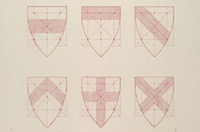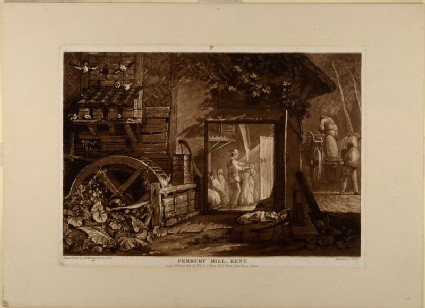Ruskin's revision to the Rudimentary series (1878)
Unpublished manuscript catalogue for proposed re-organisation of the Rudimentary series.

Ruskin's Catalogues: 1 object
Show search help- Reference URL
Actions
Pembury Mill, Kent (from the Liber Studiorum) Turner
-
Ruskin text
R|153} Pembury Mill (Interior). -
Details
- Artist/maker
-
Turner (Joseph Mallord William Turner) (1775 - 1851) (designer, etcher)Charles Turner (1773 - 1857) (engraver)
- Object type
- Material and technique
- etching and mezzotint on paper
- Dimensions
- 198 x 273 mm (sheet); 273 x 376 mm (mount)
- Associated people
-
Charles Turner (1773 - 1857) (publisher)
- Associated place
-
- Europe › United Kingdom › England › Kent › Tunbridge Wells › Pembury › Pembury Mill › Pembury Mill (subject)
- Inscription
- Recto:
all within the plate mark, etched:
top centre: P
bottom left: Drawn & Etchd by J.M.W. Turner esqr. R.A. P.P.
bottom right: Engraved by C. Turner.
bottom centre: PEMBURY MILL, KENT | London, Published June 10,1808. by C. Turner, No. 50. Warren Street, Fitzroy Square.
bottom right, in graphite, running down the sheet: 13
Verso:
top left, in ink: 153
centre left, the Ruskin School's stamp
- Provenance
-
Presented by John Ruskin to the Ruskin Drawing School (University of Oxford), 1875; transferred from the Ruskin Drawing School to the Ashmolean Museum, c.1949.
- No. of items
- 1
- Accession no.
- WA.RS.RUD.159
-
Subject terms allocated by curators:
Subjects
-
References in which this object is cited include:
References
Ruskin, John, The Ruskin Art Collection at Oxford: Catalogue of the Rudimentary Series, in the Arrangement of 1873, ed. Robert Hewison (London: Lion and Unicorn Press, 1984), cat. Rudimentary no. 153, RUD.153
Finberg, Alexander J., The History of Turner's Liber Studiorum: With a New Catalogue Raisonné (London: Ernest Benn, 1924), no. 12.II
Ruskin, John, Instructions in Practice of Elementary Drawing, Arranged with Reference to the First Series of Examples in the Drawings Schools of the University of Oxford (n.p., [1872]), cat. Rudimentary no. 153
Ruskin, John, Instructions in the Preliminary Exercises Arranged for the Lower Drawing-School (London: Smith, Elder, 1872), cat. Rudimentary no. 153
Ruskin, John, Instructions in the Preliminary Exercise Arranged For the Lower Drawing-School (London: Spottiswoode, 1873), cat. Rudimentary no. 153
Ruskin, John, ‘Rudimentary Series 1878’, 1878, Oxford, Oxford University Archives, cat. Rudimentary no. 159
Ruskin, John, ‘The Ruskin Art Collection at Oxford: Catalogues, Notes and Instructions’, Edward T. Cook and Alexander Wedderburn, eds, The Works of John Ruskin: Library Edition, 39 (London: George Allen, 1903-1912), 21, cat. Rudimentary no. 159
Location
-
- Western Art Print Room
Position in Ruskin’s Collection
Ruskin's Catalogues
-
Ruskin's revision to the Rudimentary series (1878)
153 159. Pembury Mill InteriorA study of Flour-mill life, as essential to all other life, given in the extreme of its simplicity from a Kentish Water-mill; the figures (for the second time, with the exception of the dog) being more satisfactory than in the artist’s usual work. I am so fond of the Plate that I have hitherto taken all the parts of it upon trust. I felt, on looking at it just now with a fresh eye, that I could easily spare d the dog out of it, but find on looking longer that I was wrong and that he was needed to prevent our being confined within the four lines of the door. (My friend secures me in embarrassment by asking whether “a decent dog would not have answered the same purpose, adding, most truly, that this is like one of Hogarth’s dogs .)





